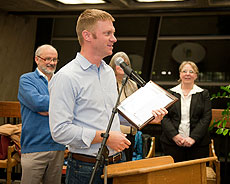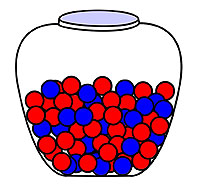|
Have a safe day!
Friday, Dec. 9
8:30 a.m.
Presentations to the Physics Advisory Committee - Curia II
3:30 p.m.
DIRECTOR'S COFFEE BREAK - 2nd Flr X-Over
4 p.m.
Joint Experimental-Theoretical Physics Seminar - One West
Speaker: Ken Herner, University of Michigan
Title: WZ/ZZ Measurements and Evidence for Diboson Processes
in b-Tagged Final States
Monday, Dec. 12
2:30 p.m.
Particle Astrophysics Seminar - One West
Speaker: Petra Huntemeyer, Michigan Technological University
Title: The High Altitude Water Cherenkov (HAWC) Observatory
in Mexico
3:30 p.m.
DIRECTOR'S COFFEE BREAK 2nd Flr X-Over
4 p.m.
All Experimenters' Meeting - Curia II
Special Topics: Application of 3D Plotter for an 11T Dipole Magnet
Prototype Endpart for CERN LHC;
DECam Imager in Chile;
SuperCDMS New Payload Operation at Soudan Mine
Click here for NALCAL,
a weekly calendar with links to additional information.
Upcoming conferences
|
|
Friday, Dec. 9
- Breakfast: Chorizo burrito
- Smart cuisine: Italian vegetable soup
- Chicken fajita sandwich
- Southern fried chicken
- Smart cuisine: Mediterranean baked tilapia
- Eggplant parmesan panini
- Assorted sliced pizza
- Assorted sub sandwiches
Wilson Hall Cafe Menu
|
|
Friday, Dec. 9
Dinner
- Red pepper soup
- Lobster tail
- Spinach w/ scallions & lemon
- Lemon orzo
- Parfait w/ cookies
Wednesday, Dec. 14
Lunch
- Cornish hen w/ cranberry-thyme sauce
- Roasted potatoes
- Broccoli
- Apple walnut cake
Chez Leon Menu
Call x3524 to make your reservation. |
|
David Schmitz receives 2011 Director’s Volunteer Award
 |
|
Dave Schmitz received the Director's Award on Dec. 7. Photo: Reidar Hahn
|
At an award ceremony on Dec. 7, Fermilab Director Pier Oddone presented physicist David Schmitz with the annual Director’s Award, recognizing Schmitz’s volunteer service.
The award is given annually to an employee, user, graduate student, retiree or guest scientist who contributed significantly to Fermilab's K-12 education programs.
Marge Bardeen, head of Fermilab Education Office, said that Fermilab volunteer outreach activities reached more than 36,000 kids and 2,500 teachers this year.
“Thank you for doing what you do,” Oddone said to the volunteers at the ceremony. “That’s one of the great things I like to brag about. That we are able to reach so many people through our volunteers and get so many people excited about science is a wonderful thing.”
Read more
—Brad Hooker
|
ANL-UChicago-Fermilab meeting - Monday, Dec. 12
On Monday, Dec. 12, from 1 to 8 p.m., the tenth Argonne-UChicago-Fermilab collaboration meeting will take place in One West in Wilson Hall.
Please visit the meeting website to see the day's schedule.
|
Neutrinos give US best shot at post-Tevatron glory
From New Scientist, Dec. 8, 2011
The world's science superpower may no longer possess the world's most powerful particle smasher, but it isn't giving up the ghost.
Last week, in the wake of September's shutdown of the Tevatron particle accelerator at Fermilab in Batavia, Illinois, 500 US physicists met at a workshop in Rockville, Maryland. They were there to discuss their prospects for making major breakthroughs in the context of a government that is increasingly strapped for cash, and without the mighty Tevatron, which was shut down because it could not compete with the Large Hadron Collider at CERN, near Geneva in Switzerland.
The initiatives discussed at the workshop could reshape the pace and type of discoveries that are made about our universe.
Read more
|
Energy Department announces new initiative to remove barriers for industry to work with national labs, commercialize technology
As part of President Obama’s commitment to helping U.S businesses create jobs and strengthen their competitiveness by speeding up the transfer of federal research and development from the laboratory to the marketplace, U.S. Deputy Secretary of Energy Daniel Poneman today announced a new pilot initiative to reduce some of the hurdles that prevent innovative companies from working with the Department of Energy’s national laboratories. The new Agreements for Commercializing Technology (ACT) will help businesses bring job-creating technologies to the market faster by allowing them to work with the Department of Energy’s (DOE’s) national laboratories from start to finish to develop and deliver new clean energy technologies and other innovations.
“To compete in the 21st global economy, we need to make it easier for businesses to move great ideas from the drawing board to the marketplace,” said Deputy Secretary Poneman. “The Agreements for Commercializing Technology will cut red tape for businesses and start-ups interested in working with our nation’s crown jewels of innovation, the national laboratories, and strengthen new domestic industries by helping bring innovative, job-creating technologies to the market faster.”
Read more
|
|
Statistical significance: Are you sure that you're sure?
 |
| All scientific measurements are based on an incomplete access to information, such as this small sample of marbles from a larger pool.
|
Read any news article about the search for new physics and you’ll quickly see the word “certainty.” It describes the probability that an observation means a discovery, rather than just a fluke. But what does that really mean?
To understand scientific certainty, there are a couple of ideas to discuss. The first one is quite shocking--almost every measurement made is incorrect. We have to be careful about what that means, because it doesn’t mean what it implies. There’s a hypothetical measurement that’s exactly perfect. While a measured value may not match the hypothetical measurement, it should agree within the uncertainties you quote.
This is hard to imagine abstractly, so let’s talk about an example. Suppose you have an Olympic-sized swimming pool that should be filled with an equal number of blue and red marbles. Suppose further that the marbles are mixed well. You don’t have the time to count every marble in the pool to verify that mix is really half and half, so you sample the marbles by grabbing a few. From that sample, you try to estimate what the percentage of blue marbles is in the entire pool.
If you grabbed a single marble for your sample, either it’d be red and or it’d be blue. Your measurement would say that the pool consisted of zero percent blue marbles or 100 percent blue marbles. Either conclusion is wrong. Luckily, it is easy to see that this approach is insufficient to estimate the mix of red and blue marbles.
Read more
—Don Lincoln
|
Fermilab ORTA web page receives a new look
Fermilab’s Office of Research and Technology Applications has a new look. The new web pages, launched this week, feature an easier-to-use navigation and contain more robust information about the available technologies at Fermilab.
Click here to learn more.
|
|